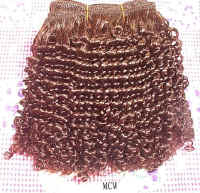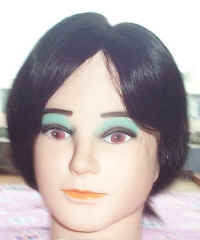
Summary
This report further exposes the widespread phenomena of China's "re-education-through-labor" camp and prison system, in which unlawfully detained Falun Gong practitioners have been forced into manufacturing products without pay ever since the nationwide persecution of Falun Gong was initiated by the Jiang Zemin regime in 1999. Over 100,000 Falun Gong practitioners are illegally detained in China's forced labor camps, where they suffer physical and mental torture from exploitation and inhumane working conditions. Falun Gong practitioners have been driven to work overtime shifts, are punished or deprived of food or sleep if assigned quotas are not met, and tortured if they refuse to cooperate (1). They are often arbitrarily detained beyond their release dates because of the huge profits that camps stand to gain as a result of cheap labor (2). The Chinese government has declared that all property rights belonging to jails and enterprises in the labor camp system are exempt from income tax and land use tax, in order to stimulate and encourage grown of this kind of enterprise and attract more foreign investment (3). Some camps, seeking to acquire more Falun Gong practitioners so as to increase profits, even bribe other camps into transferring practitioners to their facilities (4). Advertisements from economically developing areas in some Chinese provinces and cities promote cheap labor where prisons and labor camps are located, as a way to attract foreign investment (5).
Products are mostly exported to over 30 countries and regions, including the United States, Canada, Australia, France, Germany, New Zealand, and Southeast Asia. The forced labor system not only violates the basic human rights of the detainees, but also encourages abuse and torture as camps raise their quotas in pursuit of even more profit. Meanwhile, the camps use part of the profits to construct more forced labor facilities (6). In addition, the products produced through forced labor are competitive and highly attractive in international markets because of their extreme low cost. As a result, this has led some foreign companies not aware of a product's background to participate in joint venture production, importing and selling the forced-labor-produced items. This not only violates the laws of their own countries and international laws, as many countries forbid the importation and selling of products manufactured through forced labor (7), but also shakes the stability of international labor and trade markets, threatening some of their homeland companies that share the same market sectors.
A good example is the lobbying campaign initiated by the six largest U.S. textile and fabric trade organizations during their summit in Washington, D.C., on June 10, 2003. On July 2, 2003, the American Textile Manufacturers Institute (ATMI) published a shocking report stating that with the quota removal for Chinese textile products, more than 1,300 textile plants in the U.S. would have to close by early 2004, resulting in the loss of over 630,000 jobs. The U.S. textile and apparel market would be under China's control if protective measures were not implemented in a timely manner (8).
Ample evidence indicates that manufacturers such as the Shanghai Three-Gun Group Co., Ltd. the Shandong Leader Handicraft Articles Co., Ltd., and Henan Rebecca Hair Products Inc., China, collaborate with "re-education-through-labor" camps or detention centers to force Falun Gong practitioners into unpaid hard labor during their detention. The unlawfully detained practitioners are forced to endure more than 10 hours of hard labor per day or even overnight shifts in addition to their regular hours. Those who cannot meet their assigned quotas due to physical difficulty are beaten and tortured.
Products from these manufacturers are sold not only in Chinese cities but also worldwide. The "Three-Gun" brand series of underwear products by the Shanghai Three-Gun Group Co., Ltd., are sold in more than 70 countries and regions (9). The handcrafted cotton quilts made by Shandong Leader Handicraft Articles Co., Ltd., are sold in more than 40 countries and regions including the U.S., Canada, Chile, Argentina, EU countries in western Europe, Saudi Arabia, Turkey, Kuwait, the United Arab Emirates, Australia, Japan, Korea, and Singapore, with US$10 million in annual export (10). Henan Rebecca Hair Products Inc., China, has good sales channels in the U.S., Japan, Korea, Russia, Europe, and Africa, as well as in over 20 provinces and cities in China (11). Having these forced-labor-produced items in the market is deceiving to the public in these countries, since many countries have laws against importing and selling products manufactured through forced labor. It can cause the public to unknowingly participate in the wrongdoing, which is disturbing to any consumer with conscience.
Accordingly, World Organization to Investigate the Persecution of Falun Gong (WOIPFG) has conducted investigation in these three companies: Shandong Leader Handicraft Articles Co., Ltd., Shanghai Three-gun Group Co., Ltd., and Henan Rebecca Hair Products Inc., China. Investigation proves that these three companies have had a long history of collaborating with local "re-education-through-labor" camps in manufacturing forced-labor products by the detainees. (Evidence will be sent to international human rights and legal organizations.) Most of their products are for export. These three companies are all key foreign exchange earning enterprises supported by the Chinese government. The investigative reports follow.
Shandong Leader Handicraft Articles Co., Ltd.
The former name of Shandong Leader Handicraft Articles Co., Ltd., is Shandong Changyi Faggoting Factory. It has been operating for 45 years, specializing in making and exporting craft products. It is a Class B state-owned enterprise and is authorized to import and export. The company is located on 56 Limin Street in Changyi City, Shandong Province, which is near the Bohai Ocean. The main products include handmade bedding and domestic accessories under the brand name of "Lijie."
Product Photos:


Hand-sewn bedding made of pure cotton, used in households and hotels
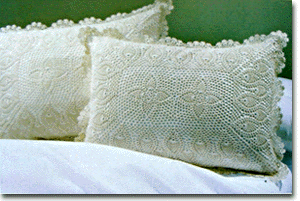

Meili Silk
Crocheted lace: This is the traditional product of the company, made of cotton thread. It is also the major export. Aside from its use in table and bed accessories, it is also used for furniture, tea tables, cushions, and other decorative purposes.
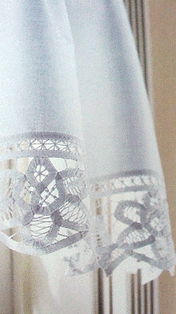 |
 |
| "Baida" brand tablecloths | Cotton curtains |
Global marketing network of the company, covering 40 countries and areas:
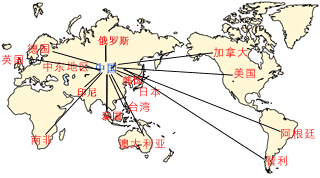
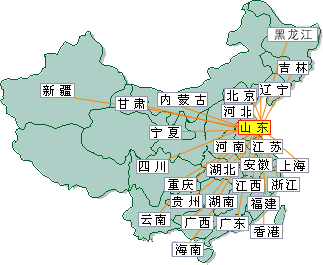
According to the website of the Shandong Leader Handicraft Articles Co., Ltd., the company was awarded with the "gold medal of national excellence for the export of a light industry product," The award for "excellent enterprise in exporting and earning foreign exchange," and the "excellent factory of China Faggoting Product Import & Export Company." It also won medals and awards overseas. In the United States, the company won an international gold medal for "excellent quality and exquisite technique." (12)
Shangdong Province No. 1 Women's Forced Labor Camp is the manufacturing site for Shandong Leader Handicraft Articles Co., Ltd. It is also called the Jinan Women's Forced Labor Camp and is located at 20 Jiangshuiquan Road, Jinan City, Shandong Province. The detainees are forced to make products without pay. Soon after October 2000, the number of detainees suddenly increased from 200 to 700, with approximately 95% of the new detainees being Falun Gong practitioners. In order to earn foreign exchange and more bonuses, the camp often forced practitioners to work extra hours to sew bedding. The over-60-year-old women were also forced to suffer through their exhaustion, working overnight in order to complete the tasks. The detainees often fall in a dead faint on the floor because of the long-term overtime and work overload. Those who refused to work were locked up in a dark, "strictly monitored" room. Rest, sleep, washing, and using the toilet outside were all denied. Detainees were forced to keep standing for over 20 days until they finally fainted. Their legs and feet became so badly swollen that they could not wear shoes and could not even walk. They were seriously debilitated, physically and mentally (13).
Within the first six months of 2002, this forced labor camp made 570,000 Yuan (US$70,000) from its production (13). Within two years, it built an office building over a dozen stories high, a reception building, and a big stockroom facility. The products it manufactured were sold to the U.S, Canada, Chile, Argentina, European Union, Saudi Arabia, Turkey, Kuwait, United Arab Emirates, Australia, Japan, Korea, Singapore and over 30 other countries. It is claimed that Shandong Leader Handicraft Articles Co., Ltd., is a major enterprise for earning foreign revenue. Its annual turnover is 70 million Yuan (US$8.5 million) and annual export is over US$10 million (10).
Shanghai Three-Gun Group Co., Ltd.
Chinese citizen Li Ying lived in Shanghai City and graduated from Shanghai Tongji University in 1992 with a major in Business Management. She worked in the Shanghai Zhonglu Management Consulting Company. On October 16, 2001, she was detained for practicing Falun Gong and sentenced to two years' forced labor in the Shanghai Qingsong Women's Forced Labor Camp. As a result of the persistent appeals of her fiancé, Australian citizen Li Qizhong, and the rescue effort of fellow practitioners all over the world, she was released on October 15 and arrived in Australia on November 29, 2003.
Li Ying was forced to do hard labor during the time she was detained in Shanghai Qingsong Women's Forced Labor Camp, making products for many Chinese companies and factories. Aside for the plush toys exported to Italy, she had to make products for the "Three-Gun" brand of underwear. According to her testimony, all the "Three-Gun" underwear marked with "examined by # 16" are made by detainees of Shanghai Qingsong Women's Forced Labor Camp. The detainees have to get up at 5 a.m. and work from 7 a.m. until 11 p.m. or 12 midnight. These long hours of labor result in badly blistered hands and fingers, while the wage is just 3 Yuan (US$0.35) a day. The detainees have to pay a boarding fee of 75 Yuan (US$9) per month, which is deducted from their meager wages (14).
Three-Gun Group Co., Ltd., is authorized to import and export. Its main product is the "Three-Gun" brand of underwear, which is sold to over 70 countries and regions. The Three-Gun Group is also a partner of the world-renown Dow Corning and Dupont companies, from which it imports technology (9).
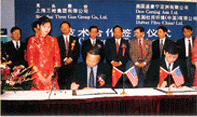 |
 |
| Shanghai Three-Gun Group Co. and U.S. Dow Corning's Asia Branch signs the technical Cooperation agreement. | "Three-Gun" brand of underwear |
Henan Rebecca Hair Products Inc.
Xuchang City and Yuzhou (a county within the jurisdiction of Xuchang City) in Henan Province are the largest producers of hair products in China. There are 64 hair product companies in this area. Located in Xuchang City at 288 South Wenfeng Road, Henan Rebecca Hair Products Inc., initiated by a sole proprietor, is the largest company specializing in hair products in China. This company manufactures primarily five series and more than one thousand kinds of hair products, including both human and synthetic hair weaves, synthetic wigs, mannequin wigs, and men's toupees.
Synthetic wigs Human and synthetic hair weaves Men's toupees
The import and export situation in Henan Province's state-owned enterprises is generally poor. As the Chinese government changed the rules for importing and exporting rights from requiring approval to simply requiring registration, large numbers of public and private manufacturing companies have obtained importing and exporting rights. This has stimulated hundreds of hair product companies in Xuchang to set up joint ventures with foreign entrepreneurs. Most of the hair products are exported, and these products have been the No. 1 export and source of foreign exchange income for Henan Province (15).
In 1989, the national Light Textile Investment Corporation in Xuchang provided 2.1 million Yuan (US$250,000) of loan money to establish the Xuchang County Hair Products Factory headquarters. Zheng Youquan was appointed manager of the factory. In 1996, the factory invested US$1.26 million to enter a joint venture with the New Asia Company of the United States to form Henan Rebecca Hair Products, which later incorporated. Eventually, the New Asia Company sold their interest (16). From then on, Rebecca Hair Products could be sold directly in the United States (17).
Competition within the hair products industry is very intense since it is a highly specialized industry with minimal barriers in terms of capital, technology, and marketing, and since almost 100% of the products are exported. Furthermore, since the price of human hair raw materials and labor constitute a significant percentage of the overall product cost, companies fight for raw material resources and cheap labor. As a result, the detainees in nearby labor camps, jails, and detention centers have become the slave laborers for making low-cost hair products. Analysis of the situation reveals that this is one of the main reasons labor camps became the production sites for Henan Rebecca Hair Products Inc. In addition, Zheng Youquan, chairman of Henan Rebecca Hair Products Inc., said, "With market growth, Rebecca needed to expand urgently, but we could not get the approval for the site. After the city's CCP party committee secretary Liu Chunliang heard about this, he immediately ordered related departments to process this with special attention and soon a site was settled."... "In order to help us expand into a larger and stronger industry, the city government provided a series of preferential benefits and support, and huge support in enterprise examination and approval, credential handling, and loans." ... "The related departments in the city government also went outside to look for investment and enabled hair product companies to have overseas capital. This not only alleviated the fund bottleneck during the hair product industry's development stage but also brought the talented personnel and managerial experience, and opened up the export channel." (17)
From that point on, over 800 detainees (including illegally detained Falun Gong practitioners) in Henan Province's No. 3 Labor Camp and the Shibalihe Female Labor Camp in Zhenzhou City have been pushed to work day and night by guards who threaten them with torture, punishment, and humiliation. They work extra hours to bring in foreign exchange income and more profit for the labor camps and Henan Rebecca Hair Products Inc. To increase profits, Henan Province's No. 3 Labor Camp even "buys" Falun Gong practitioners as slaves from other places for 800 Yuan (US$100) each. When the labor camp was short of funds and was about to be shut down, many Falun Gong practitioners were abducted and incarcerated in this camp where they were forced to make hair products, thus reviving the labor camp's business (4).
According to a witness, "Henan Province's No. 3 Labor Camp was awarded the 'National Civilized Work Unit' citation from the Central Politics and Law Committee '610 Office' and the Labor Camp Bureau, for persecuting Falun Gong. At the time the award was put up, three detainees fainted from exhaustion. Qu Shuangcai, Director of the No. 3 Labor Camp, brutally persecuted Falun Gong practitioners and was favored by his superiors. In May 2003, he was transferred to the Shibalihe Female Labor Camp in Zhenzhou City and promoted to director of that labor camp. Right away, he signed a contract with Henan Rebecca Hair Products, Inc. He also instituted the use of straightjacket restraints for torturing practitioners. Within several months of his arrival, three female Falun Gong practitioners were tortured to death." (4)
In recent years, the Henan Province hair products industry has maintained a high growth rate. Before 1995, the total export was only around US$10 million. In 1996, it increased to US$45.25 million. The total export of hair products reached US$110 million in 1999, exceeding US$100 million for the first time. The year 1999 was when Jiang Zemin's regime initiated the full-scale suppression and illegal detention of Falun Gong practitioners. According to numerous reports, tens of thousands of Falun Gong practitioners were forced to become unpaid slaves to produce goods for export. In the first 10 months of 2002, the hair product export of Henan Province reached US$138.86 million, which made it a big industry with over 1 billion Yuan (US$125 million) in revenue (18), and Henan became the largest hair product manufacturer in the world. The hair product industry has had a consecutive annual growth rate of nearly 30%, and Henan's hair products have a market share of one fourth of the world's total (15). On January 20, 2003, Zheng Youquan, chairman of Henan Rebecca Hair Products Inc. told reporters that in 2002 the company had foreign exchange income of US$49.43 million (17), which was an increase of 20.9% from the previous year. Owning five labor camps/hair product factories, Henan Rebecca Hair Products Inc. has been the world's leading producer of human hair weaves for five straight years (19).
Through their more than 2,000 distributors and sales centers in China and abroad, Xuchang hair product companies have continuously imported human hair from India, Russia, Vietnam, and various places in China. After careful combing and processing in the Xuchang factories, it becomes the beautiful hair products sold to dozens of countries and regions, including the U.S., Western Europe, Korea, Japan, Russia and Africa (18).
According to sources, the U.S. is the largest distribution and consumer market of hair products in the world. Rebecca accounts for 80-90% of the total export from Xuchang, and has a market share of over 65% in the United States (11). The June 22, 2003, issue of "March into the International Big Circulation" reported: "The hair products from Xuchang have occupied one fourth of the U.S. market." Currently, six U.S. companies have offices in Xuchang. Statistics show that the U.S. has a need for 15 million human hair weavings, 10 million of which come from Xuchang (17).
Forced slavery in labor camps exists under the instigation of Chinese government policies. The establishment of these modern-day concentration camps masquerading as "re-education centers" is in fact in violation of China's own constitution. Camp conditions and procedures are not monitored or inspected, the camps are not required to publicize their activities, nor do they need any defense by attorneys. In fact, these "re-education centers" have become not only instruments of dictatorship but also criminal tools used at will by corrupt officials in China to lure foreign corporations that are uniformed of the true situation into participating in human rights abuses for the sake of profit.
It is the hope of WOIPFG that the international community will unite to condemn such practices and prohibit products to be made using forced labor under inhuman conditions, as well as the sales and distribution of such products, and ensure that international laws are enforced.
References:
Appendix I: Testimony of Li Ying
Shanghai Female Labor Camp is located in Qingfu County in Shanghai.
Address: Qingsong Road 7501, Zip Code: 201701
General Telephone: area code 021 followed by 69209148.
The Shanghai Female Labor Camp was established in the year 2001. Thus it looks fairly new. After the main gate, there is a big garden in the center, a hospital and the camp's technical school on the right-hand side, and a dining room on the left. In the back, there are four buildings with five floors on both sides and a playground in the center. All these fine things on the surface cannot hide the fact that it persecutes Falun Gong practitioners. Since 1999, following Jiang's order, this camp has imprisoned thousands of Falun Gong practitioners illegally. In order to reach its so-called quota for brainwashing, the camp uses all sorts of brutal means to torture Falun Gong practitioners. These methods include "hanging with strings" (where a victim's hands are hung up from the back on iron window poles with only his or her toes barely touching the ground), physical punishment (where a victim is punished by being made to stand or sit on a small bench without moving for as much as four months at a time), inciting hatred among other prisoners and encouraging them to swear at and beat Falun Gong practitioners, extending sentences, detention in isolated cells with very limited rights, sleep deprivation, denying contact with family members, and so on.
This forced labor camp cooperates with the Shanghai Three-Gun Group Co., Ltd., to produce cotton pants, sweaters, underwear, and other casual clothes with the brand name " Three Gun." All "Three Gun" products with serial number 16 are produced in this labor camp.
In the labor camp, I was forced to do all kinds of labor, including making various toys, leather shoes, wallets, and lanterns; packing toys; sewing; making "eye knobs"; assembling auto Majiang machines, and so on. Usually I get up between 5:45 a.m. and 6:15 a.m. and start work around 7:00 a.m. until around 11:00 p.m., while the legal schedule is until 9:00 p.m. Sometimes I have to work until midnight or two or three o'clock in the morning. Only by putting in overtime can I finish the work for my stipend of 65 Renmin dollars ( 8.3 Renmin dollars = US$1.00).
Most of products from this labor camp are exported to other countries. From December 2001 to May 2003, every six months there are orders for "eye knobs," with every order requesting 500,000 items. They are exported to Japan. An eye knob is a type of Chinese handicraft. It is said that such handcrafted eye knobs are one of the accessories found on traditional Japanese clothes. There are four sizes: 1.8 cm, 2.5 cm, 2.8 cm, and 3.3 cm. the colors are red, light green, white, yellow, and sapphire blue. Every day we have to make 400 of these items. In the beginning we couldn't even finish 200. In order to finish the task, everyone has to work until midnight and wake up around 4:00 a.m. the next morning. Our fingers become swollen and worn.
From April 2002 to February 2003, we received two orders for dolls. We had to make the decorations for the dolls from head to toe, including hair accessories, hat, clothes, and skirt, and pack the dolls with things like shoes, pants, eyeglasses, scarf, and sweater that were sent from other places. The product instructions indicated that the dolls were for exporting to Italy and the brand name was "My Doll." Since dolls would be shipped from the labor camp directly to the box containers at the port, the
deadlines were strict. Our workload was 120 dolls per person. However, the quickest worker could only complete about 100. In order to meet the delivery deadline, we frequently had to work until 11 p.m. and sometimes till dawn the next day.
We also had to make holiday lights. There were several different procedures for making them. One way was welding the two feet of the light bulb to the wire with a liquid chemical and tin. This had to be done in a room without airflow since wind would make the welding fail. June and July in Shanghai are the hottest months, yet we could not turn on the electric fan. There were nearly 100 people in the 60-square-meter room that was filled with smog and irritating smells. We felt dizzy and nauseated after staying in the room for a long time. There was another procedure for inspecting the lights. After working whole day, we saw lights in front of our eyes. Our eyes were constantly tearing and the eyesight decreased dramatically. Everything we saw was fuzzy.
To make wallets, we had to hold a wallet tight with our legs and use the needles with two hands. Since we were not skilled at sewing with two hands, the needle frequently stabbed our hands. After being continuously tense for more than 10 hours, our legs became swollen. In the beginning, we were given a workload of 15, but as we became more skillful and were just able to finish our quota, they increased the workload to 20, 25, and 40 in the end. My hands hurt so badly that the pain often woke me up at night. The next morning at work, my hands were so painful that I could not pull out the needle and had to use tweezers to do it.
We were also ordered to process a special kind of light bulb. We had to fix the feet of the light bulbs together by using a large iron clip. One package held 5,000 light bulbs and we had to complete one and half packages every day. My hand holding the iron clip became swollen, and my fingers were so stiff that I could not extend them for the entire night; the pain often woke me up at night. The fingers of my other hand holding the light bulb became deformed.
I have made various products in the forced labor camp. The above are just some examples. In the labor camp, they made our workloads according to a full 10-hour work schedule. We were paid 3 Yuan if we could finish the workload. Only ten percent of the inmates who had been incarcerated several times before could complete their workloads. Forty percent of the people could only make 2.5 Yuan. The camp allotted us varying amounts of food according to the workloads we finished. If we earned less than 50 Yuan per month, they only gave us vegetables every day. Yet we still had to perform heavy labor such as loading and unloading cargo, and sometimes we were tortured by having to perform drills in which we were forced to run, drills in formation, or repeatedly do squats.
Li Ying
March 30, 2004





